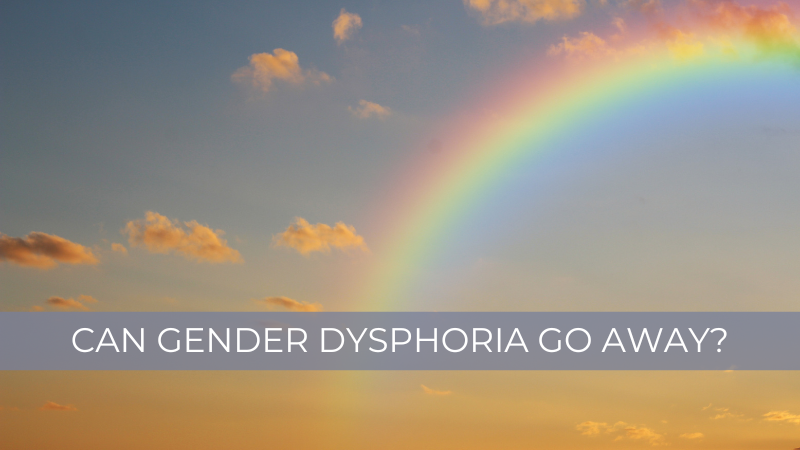Can gender dysphoria be treated, does it go away, or is it a lifelong occurrence?
For some people, gender dysphoria can get better or worse over time. Gender dysphoria can intensely affect trans people. People can feel a disconnect between the shape and behavior of their body and their internal gender, and/or they can feel terrible socially when people misgender them, and/or they can wish to seek gender affirming medical care.
Because gender dysphoria is so influenced (in some cases caused) by the toxic and discriminatory culture we live in, it will most likely not get better if nothing changes in someone’s life. Yes, gender dysphoria can go away for some people, and many of those people took steps to transition socially or medically.
Read on for more details on: can gender dysphoria go away?

Hi, I’m Rey, a nonbinary writer! Please subscribe for more stories and resources:
How do I recognize gender dysphoria?
Gender dysphoria can be an icky, crawling feeling that something is wrong or bad, with ourselves. Everyone experiences feelings a little differently so I certainly can’t speak for everyone. My understanding is that gender dysphoria is a negative, terrible feeling that occurs when someone is misgendered, either by others or by themself (for example, considering the shape of their body to be incorrect for their gender).
Trans people sometimes realize they are trans because they have the symptoms of gender dysphoria. Not in all cases though! – I know trans people who did not feel gender dysphoria.
Does gender dysphoria go away?
When cis people ask this question, they usually mean, can gender dysphoria go away if a trans person just pretends they are not trans. That’s…not how it works. A person tends to have gender dysphoria when something feels wrong about their current gender expression or the way people socially react to them. For some people, transitioning so they are read as a different gender by society is the best and only way to relieve gender dysphoria.
Some people have gender dysphoria that fluctuates in episodes. Genderfluid people might especially have a different experience of gender day-to-day. So if dysphoria goes away temporarily, it might come back later.
Transitioning or otherwise expressing your gender identity in a way that feels good and healthy is one of the best ways to reduce gender dysphoria.
What can I do to reduce gender dysphoria?
Gender dysphoria is really uncomfortable. It can make you feel bad about your thoughts and feelings, bad about the shape of your body, bad about the clothes you’re wearing. Feeling dysphoric can overlap with experiencing toxic transphobic responses from family or community, which is painful all on its own.
I don’t have a cure for gender dysphoria, especially if you are in an environment where it is impossible to transition. You are not alone in feeling this way. Be gentle with yourself. Try to reduce unnecessary stressful situations. Go outside if that feels good. Take a nap. Spend time (in person or online) with people who support you and your gender identity. Wear gender-affirming clothes, even if it is just for five minutes in private.
In the long term, be aware that the way to reduce gender dysphoria is to accept and support your own gender identity, perhaps with social or medical steps towards transitioning. If this is not available to you, you can still support and understand yourself internally, even if you cannot express yourself externally at all.
What if I don’t feel gender dysphoria? Am I still trans?
Yes, absolutely. Some trans people don’t feel gender dysphoria. Some people are so dissociated before transition that they don’t realize they were feeling that way, and some people just don’t experience gender dysphoria. They feel better, happier, and healthier as they transition. Experiencing gender euphoria, not dysphoria, with a new different gender expression is one type of trans experience.
Gender dysphoria is an unpleasant experience. I wish every trans person had the help, love, and support needed to express themselves in a way they do not feel dysphoric. For some people, it does get better, with changes over time. Take care of yourself please!
